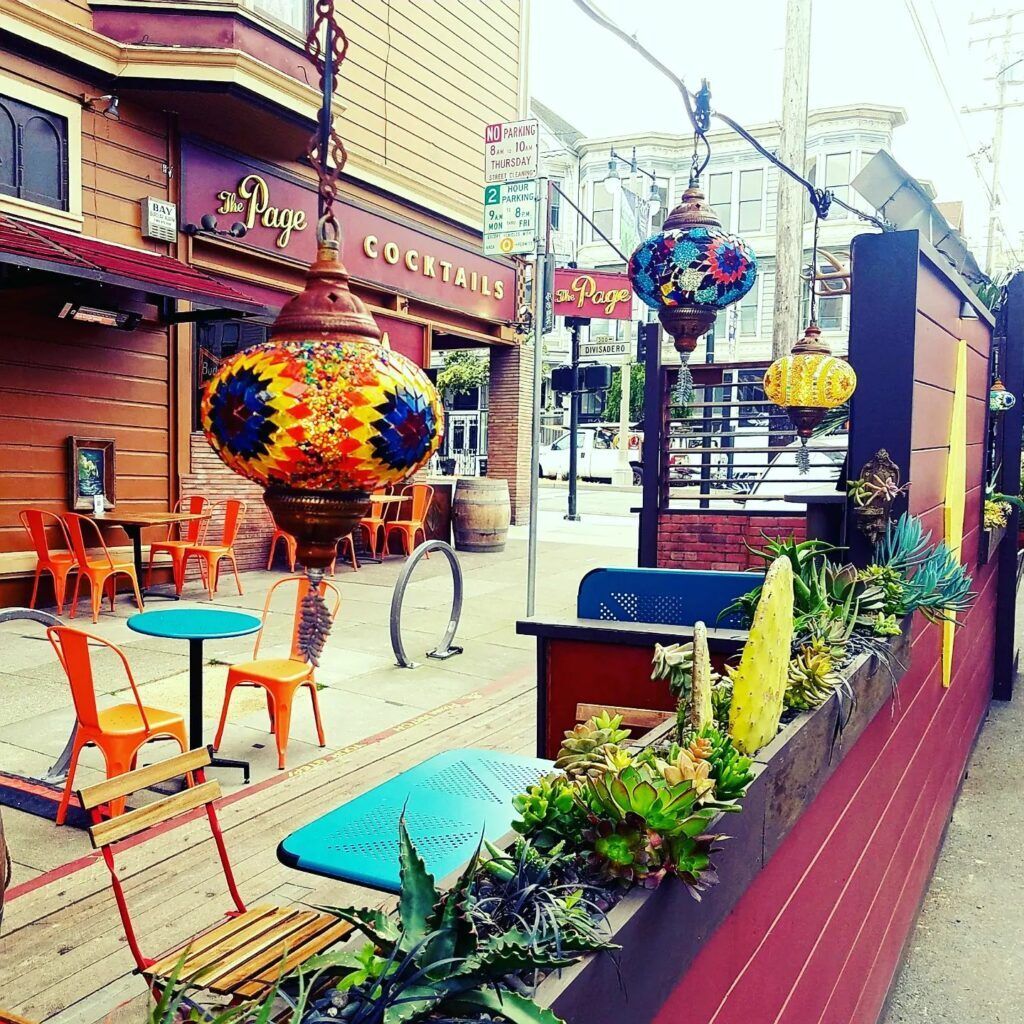
The Page on Divisadero might have SF’s best parklet. Photo from The Page’s FB page
“Under the seeming disorder of the old city, wherever the old city is working successfully, is a marvelous order for maintaining the safety of the streets and the freedom of the city. It is a complex order. Its essence is intricacy of sidewalk use, bringing with it a constant succession of eyes. This order is all composed of movement and change, and although it is life, not art, we may fancifully call it the art form of the city and liken it to the dance <…> The ballet of the good city sidewalk never repeats itself from place to place, and in any one place is always replete with new improvisations.” ~ Jane Jacobs, The Death and Life of Great American Cities.
The pandemic was a no good, terrible, awful thing. The consequences of which are still reverberating. However, there was one positive result for the city of San Francisco – the Parklets!
They began as a necessity, a way for small bars and restaurants to stay open when merely being inside a space next to a stranger or even a friend could be a death sentence. Air, oh precious air. But they also should have existed ages ago. I have long wondered why there were so few outside tables in the city. Certainly, the weather in San Francisco is very temperamental. It has been known to regularly throw a fit right around 5pm when the tides begin to roll in, turning what was otherwise a balmy day into a landscape of chill and gloom. Woe to anyone who hadn’t yet formed the habit of always keeping a sweater in their bag. But despite the potential gloom, those few outside tables that did exist were always highly coveted.
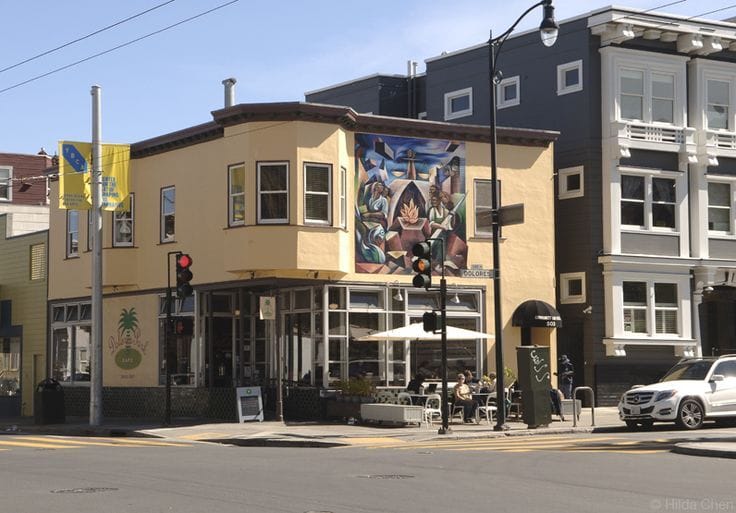
Dolores Park Cafe always had some of SF’s rare, coveted, outdoor seating. Photo by Hilda Chen.
For instance, those tables stretching out to the corner at the Dolores Park Cafe, the outside area at the Revolution Cafe in its hey day and finally, in my fond memory, the one table on the street outside the Latin American Club. My friend – a local great producer and one considered by many to be the queen of 22nd street – and I, often commandeered that table on a Thursday evening. We met to enjoy each other’s company but we also, it could be said, held court. Friends would stop by and chat for awhile, songs might be sung and the culture of the street eddied around our little table. I am specifically mentioning the Mission district as that was my stomping ground before I moved to Oakland but also because, unlike many other areas of the city, it’s sunnier. It’s a perfect place for Parklets!
Which is why I was so dismayed to discover upon walking to get the train home after working at the Rite Spot, the parklet at the Uptown being torn down.
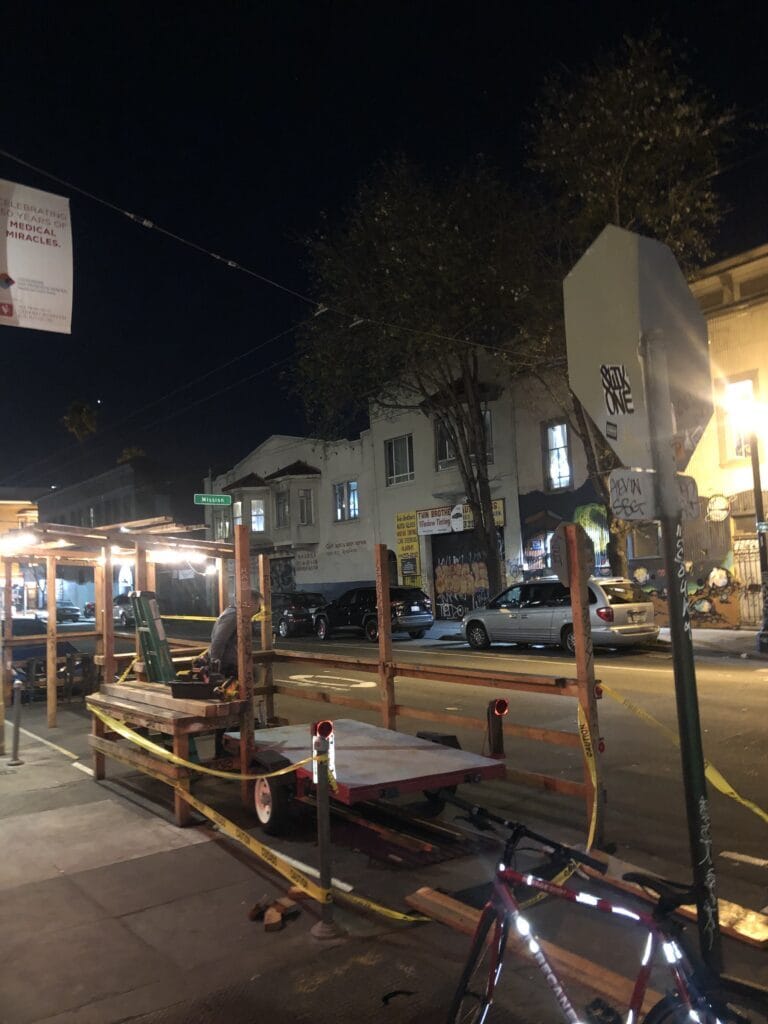
The Uptown parklet being torn down. Featured is Sean Butler, brother of Uptown Manager Tym Butler.
It was my favorite parklet. I’ve had great conversations with poets and punks in it at night. It was also a great place to get a reprieve from the rain or the odd, glaring sun in an afternoon.
So why did they remove it?
On April 1st, the city put into effect the continued fee system for businesses to keep the parklets. “The new Shared Spaces program, established in 2021, charges a one-time $3,000 fee for a single parking-space permit, and $1,500 additional for a second parking space. On top of that there’s a $2,000 annual license fee per parking space, but it’s $1,000 per space for restaurants with gross receipts under $2 million”.
For a more well-trafficked and well-funded establishments, these fees are pocket change. But for smaller, locally owned businesses those fees can be prohibitive. Sean Butler, who built the parklet, says, “The city has made it impossible for small businesses to be viable. Only the people who can afford it will benefit from it. But most people can’t do that. It becomes, once again, a pass to the already established and wealthy”.
Because there are not just the mandated fees but there are also the costs of maintenance and upkeep. Graffiti will happen and is de rigueur for any urban surface but the cost of removing it falls on the business owner.
Paula Tejeda who owns Chile Lindo, also took down her parklet that had been a great gathering place of local musicians. She says, “I tore mine down because you can’t imagine how exhausted I am at being squeezed between bureaucracy, righteousness, and the graffiti that we have to clean or we get fined by the bureaucracy. Meanwhile, having to pay licensing fees and as well as high rent for the space itself, can drive any struggling business owner mad”.
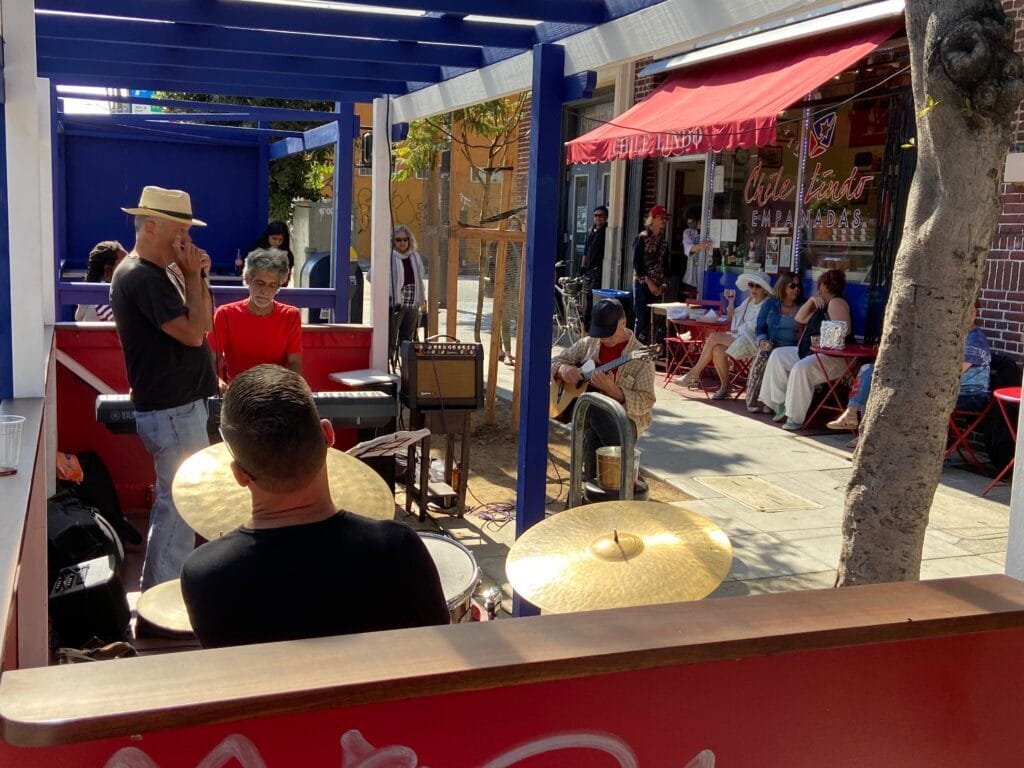
Chile Lindo. A Saturday night with Eduard Corzo (piano), Paul Lyons (harmonica, trombone), Brian Fishler (drums). Photo courtesy of Paula Tejeda.
We also tore down ours at the Rite Spot because of the fees. But for us that was a bit of a blessing. On our particular corner, that parklet had become a regular hellscape of debris. All the trash blown in by the wind roaring down 17th st. crossed by the gales blowing across Folsom, was copious and even, anthropologically fascinating. What are people eating, wearing, throwing away in the neighborhood? We knew. Then, of course, there were the used condoms, accessed needles and um, human evacuations. It also often became a shelter for those who have no rented roof. So, though it had been nice to provide a spot for people to sit outside and enjoy smoking while having a drink or being able to care for their dog, we were glad to see it go.
It must now be stated that for employees and singular business owners, the parklets could be a bit of a pain in the ass. As said by Tym Butler, the manager at the Uptown, “We had to haul in and out the tables and chairs every day. We had to string the lights out and across the sidewalk, laying down protective covering for the electrical cords, every day”. One of the bartenders seconded this complaint and added that she had to throw away, every day, the cloth she used to clean the parklet from just the general soot, exhaust and city filth that would accumulate overnight. However, despite the challenges of maintaining an outside space they both confirmed that they appreciated the parklet. They liked that the customers liked it so much.
Now, where the Uptown parklet once stood, are just two parking spaces. Instead of a charmingly lit outside space of human congregation, there is only the drab sight of curb and car.
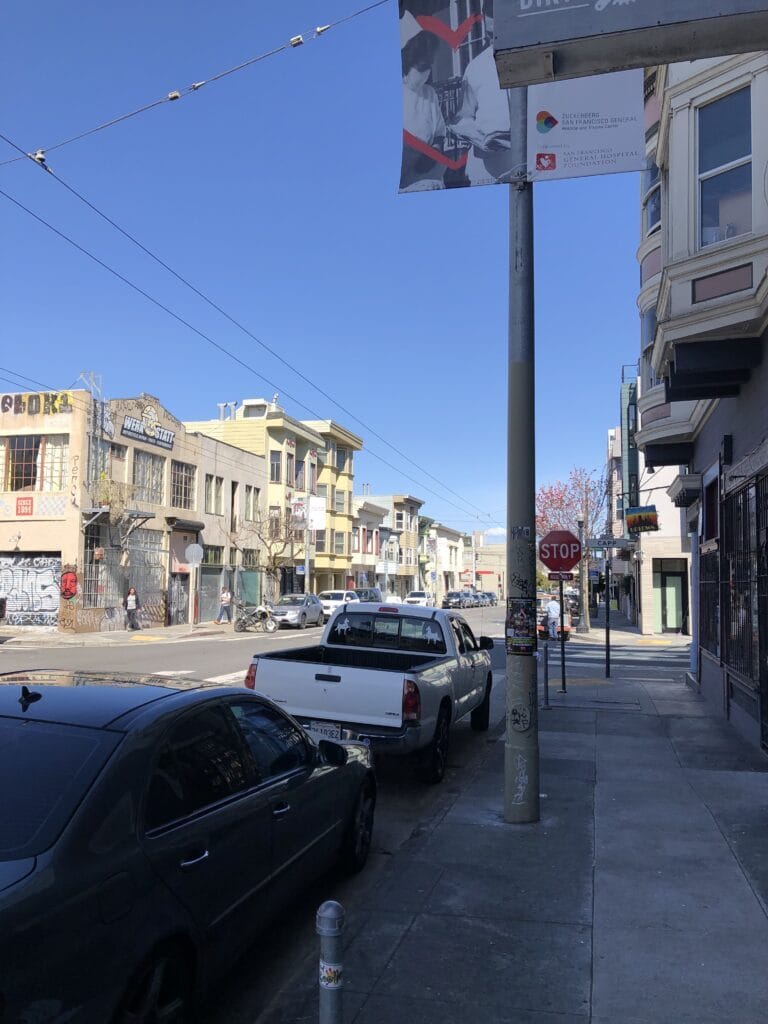
The area where the Uptown parklet used to be. Photo by the author.
Granted, I am not only a regular user of public transportation I’m also a passionate advocate of it…but I get it, parking in the city was already difficult. However, are two parking spaces really worth removing the parklets? According to the city, yes. The revenue from parking meters and parking citations earned the city over 51 million dollars in 2022. Exactly how that revenue is being spent however, is undetermined.
Practically, I understand the city charging the fees. Post-pandemic, they are no longer as needed for safety. But philosophically and personally, I find the fee mandate atrocious and the dismantling of the parklets as a result, awfully sad. Public, accessible, outside spaces are vital to the thriving spirit of any city.
I was delighted when I visited Chicago to discover that there were outside spaces everywhere! Outside spaces with blooming flower boxes, outside spaces stretching to the edge of the sidewalk and overlooking the lake or, in the one case of an old speakeasy, a lumber factory. When I lived in New York, the most wonderful thing to do on the first spring day was just to walk around. Everybody was out. They were at this cafe or that bar and one could see old friends and meet new friends all while just simply, wandering around. I mention these two cities because they have great outside spaces but also because – though it gets very hot in the summer months – the winter is brutal. Yet, still the outside spaces exist. Because they must. We need them.
I can already hear a chorus of argument waiting in the wings. Why do we need them? Aside from my fervent belief that outside spaces can help to heal the divisions rife within diverse populations and bring us closer together in good ways, there are two practical reasons for a few tables, under shelter, being available on the street. One is that many small, local establishments aren’t wheelchair accessible. Parklets, by design, are. The second is crime. Parklets create natural witnesses.
I was once mugged by three men, in the broad daylight of an afternoon on 21st street. No one was about but had there been a parklet holding close a few people enjoying the early evening, they might not have even tried. The smashing of car windows is so ubiquitous to the Bay Area that running a glass replacement business could pay for your kids to go to college. Windows, potentially, are less likely to be smashed if there are folks bearing witness. Lastly, there are eyes about. Cities can be terribly lonely and fraught with a sense of invisibility and to be seen, if only incidentally, can do a world of good.
I am not alone in my advocacy of the parklets. District 11 Supervisor Ahsha Safai recently proposed temporarily eliminating permit fees for Curbside Shared Spaces. Says Safai, “In March 21st, 2023, I introduced legislation to waive permit fees for parklets for the first year. Small businesses have been struggling to stay open since the COVID-19 pandemic started. We want small businesses to keep this money to reinvest it back into their staff, the neighborhoods they serve, and to keep their businesses open. The legislation is currently on a 30 day hold and we have requested that it be heard at the Budget and Finance Committee as soon as possible”.
I have a more radical proposal, which is that the city should actually give funding to small businesses to maintain the parklets. But Supervisor Safai’s legislation is a great start. I support it.
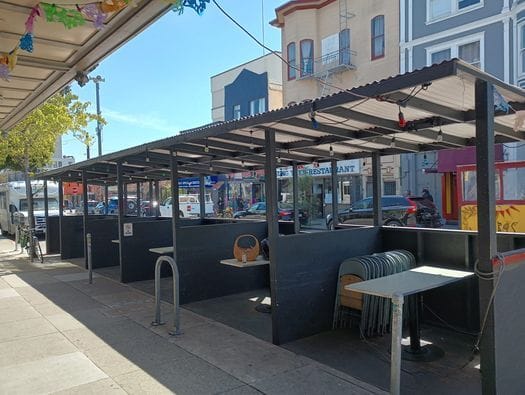
The fancy parklet at the Latin American Club. Photo courtesy of Corey Allen Porter.
Before the possible hearing – which I may attend and argue my case if possible – one of the interesting benefits mentioned by the Uptown bartender is that she liked not having to ‘police’ people bringing their drinks outside. It was all finally, okay, “like New Orleans”, I said and she laughed and said, “yes, yes, but in a quieter way”. Also, though she expressed irritation about having the clean the parklet at her own place of work, she loves going the parklets at other places.
The Uptown wants to build one again. Paula would love to build one again. That’s how much they honor the entire concept of the Parklet. They just don’t want it to be so difficult to create a beautiful place for people to come together outside and on the street.
The post San Francisco Has its Parklet Policy All Wrong appeared first on Broke-Ass Stuart's Website.







